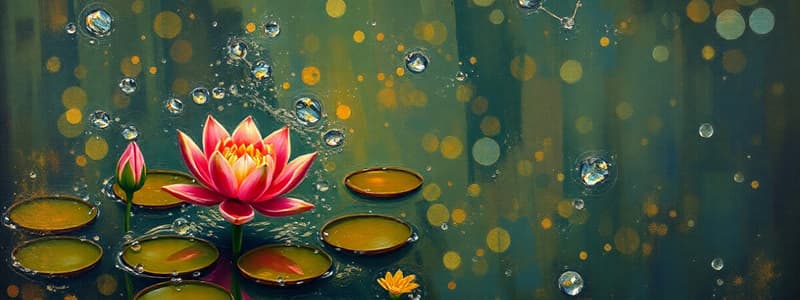Podcast
Questions and Answers
What is the role of water in biochemical reactions?
What is the role of water in biochemical reactions?
It serves as a solvent in which most biological transformations take place.
Water can dissolve nonpolar molecules like oils.
Water can dissolve nonpolar molecules like oils.
False (B)
What percentage of cell weight does water constitute?
What percentage of cell weight does water constitute?
- 90-100%
- 50-70%
- 40-60%
- 70-85% (correct)
What type of bond is present in the water molecule?
What type of bond is present in the water molecule?
What is the hydrophilic characteristic?
What is the hydrophilic characteristic?
What occurs during the ionization of water?
What occurs during the ionization of water?
What is an example of an amphipathic molecule?
What is an example of an amphipathic molecule?
Which of the following describes hydrogen bonding?
Which of the following describes hydrogen bonding?
Water is often referred to as the ______ solvent.
Water is often referred to as the ______ solvent.
What is the significance of hydrogen bonds in biology?
What is the significance of hydrogen bonds in biology?
Flashcards are hidden until you start studying
Study Notes
Water: The Solvent for Biochemical Reactions
- Water is crucial for biological processes, comprising 70-85% of cell weight.
- It's present in bodily fluids like blood, urine, and saliva.
- Water acts as the solvent for biochemical reactions, facilitating transportation, temperature maintenance, waste removal, and digestive fluid production.
Molecular Structure of Water
- A water molecule consists of two hydrogen atoms bound to an oxygen atom via polar covalent bonds.
- Polar covalent bonds occur when electron sharing is unequal due to differences in electronegativity between atoms.
- This uneven distribution makes water a polar molecule.
Solvent Properties of Water
- Water's polarity enables it to readily dissolve ionic and polar compounds through:
- Ion-dipole interaction: Attraction between charged ions and the polar water molecules.
- Dipole-dipole interaction: Attraction between polar molecules.
- Water cannot dissolve nonpolar molecules (like oils) due to the lack of dipoles.
- Hydrophobic: Nonpolar molecules that don't dissolve in water.
- Hydrophilic: Molecules that readily dissolve in water.
- Amphipathic molecules: Possess both polar (hydrophilic) and nonpolar (hydrophobic) regions. Examples include long-chain fatty acids.
Micelle Formation
- Micelle: A spherical arrangement of organic molecules in water solutions where hydrophobic tails cluster inward, and hydrophilic heads face the water.
Hydrogen Bonding
- A special case of dipole-dipole interaction where hydrogen, covalently bound to a highly electronegative atom (oxygen or nitrogen), interacts with the electron pair of another electronegative atom (usually oxygen or nitrogen).
- Essential for stabilizing the 3D structures of biological molecules like DNA, RNA, and proteins.
Acids, Bases, and pH
- Ionization of water: Water molecules transfer protons (H+) to form hydronium ions (H3O+) and hydroxide ions (OH-).
- This process is reversible.
- The equilibrium constant (Keq) describes the extent of ionization.
Studying That Suits You
Use AI to generate personalized quizzes and flashcards to suit your learning preferences.




